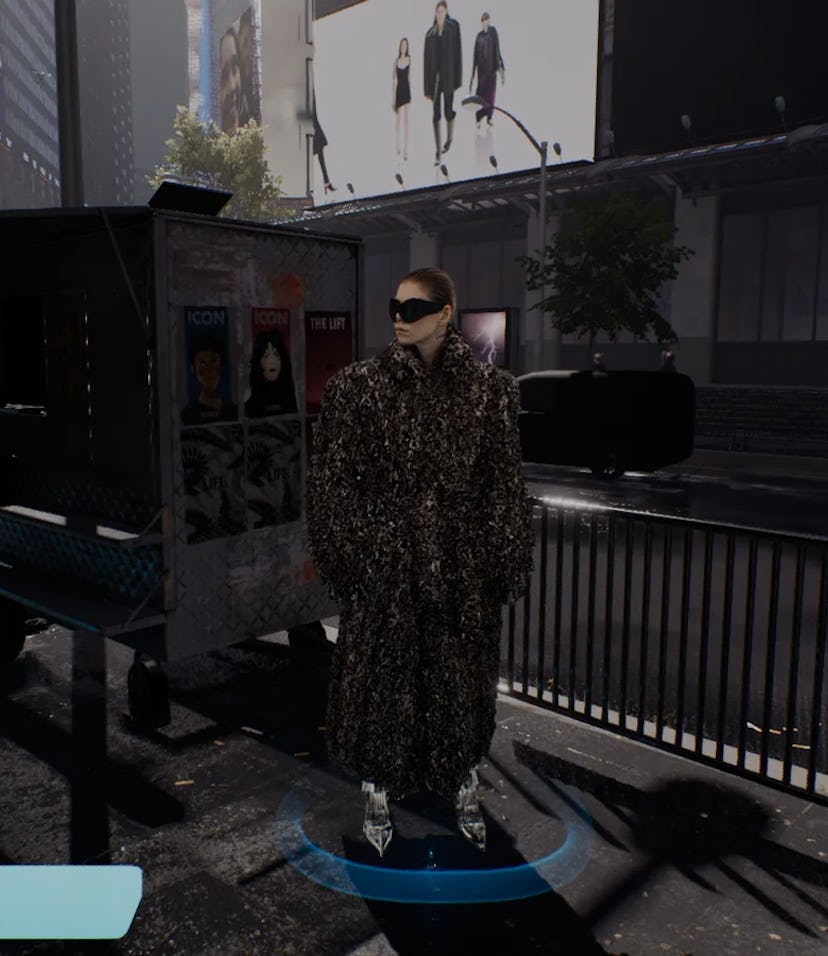Style
Want to wear Balenciaga in the metaverse? The brand is making it happen.
The virtual venture will include more than products, offering projects and experiences too.

Over a year after debuting its video game runway, Balenciaga has announced it’s launching a new business “dedicated entirely to the development of products, projects and experiences” designed for the metaverse. As The Fashion Law notes, the metaverse is becoming a new forefront for retail, and Balenciaga’s business decision comes shortly after brands like Gucci, Nike, Adidas, and GOAT created their own digital worlds to translate virtual sales to real ones.
“Right now, the climax of interaction with a luxury brand is that you click like, or comment, or you buy something,” Balenciaga CEO Cédric Charbit said at a Business of Fashion conference on December 2. BoF reports that the Charbit believes “we can get to the next level” by way of the metaverse, as companies, including those in the fashion field, are taking “gigantic steps every day” when it comes to virtual experiences and offerings.
Byte-sized Balenciaga — What “gigantic steps” Balenciaga plans to take are still under wraps, although the brand has already miniature steps into virtual fashion. The label released its Fall 2021 collection via a video game, and collaborated with Fortnite on a capsule of digital apparel for players, later accompanied by tangible versions. As the metaverse goes mainstream, brands seemingly want to use the digital world as a means to connect with (and profit off of) young consumers, and the continuation of cyber collections insinuates that the move is working.
Balenciaga’s newest initiative joins other luxury brands like Gucci, which recently staged its own virtual reality fashion exhibit on Roblox. There, a digital version of Gucci’s Dionysus bag sold for 350,000 Robux — roughly $4,115 — despite its confinement within the online gaming platform. Tangible versions of the bag, which can be worn anywhere, usually retail for $3,400. Already, we’re witnessing digital drops accompanying real ones, with a growing value attached to the virtual iterations.
Nike and Jordan Brand, both of which boast impressive resale value in the real world, have expanded their offerings to the online world, too. Within their respective virtual environments, hosted on Roblox and Fortnite, users can wear branded apparel alongside sneakers like the Air Force 1 and coveted “Cool Grey” Jordan 11. Exclusive digital products can be unlocked through mini games and scavenger hunts, which may encourage the development of a resale market solely for virtual goods — just like in real life, if a product is out of reach, you may be able to buy it on the secondary market.
More than digital products — Brands, especially ones like Balenciaga and Gucci, will likely balance between making some products exclusive as well as making others available to everyone for a small price — much like Gucci’s $9 augmented reality sneaker. Although a one-off virtual product may sell for thousands thanks to its limited availability, companies can easily benefit from offering virtual products to the masses: A $9 sneaker can turn a lot of profit if bought by thousands of digital shoppers, and it boasts a much simpler production process than a tangible product.
Per its announcement, Balenciaga won’t just offer digital digs, “projects and experiences” are also expected within its metaverse. That may mean perfecting your avatar’s runway walk or shopping within a virtual reality Balenciaga store with Kim and Kanye — but only time will tell.